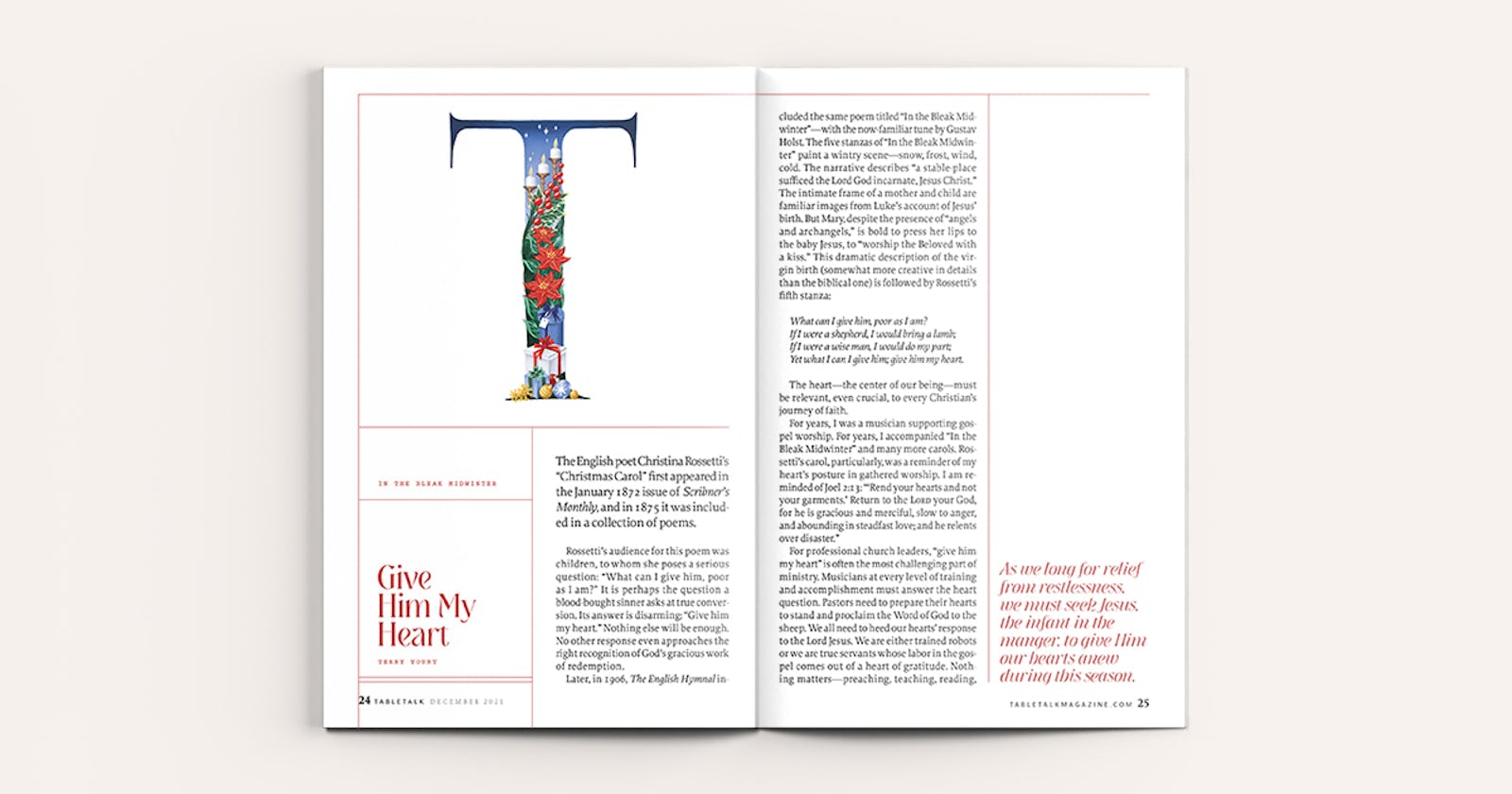
Request your free, three-month trial to Tabletalk magazine. You’ll receive the print issue monthly and gain immediate digital access to decades of archives. This trial is risk-free. No credit card required.
Try Tabletalk NowAlready receive Tabletalk magazine every month?
Verify your email address to gain unlimited access.
The English poet Christina Rossetti’s “Christmas Carol” first appeared in the January 1872 issue of Scribner’s Monthly, and in 1875 it was included in a collection of poems.
Rossetti’s audience for this poem was children, to whom she poses a serious question: “What can I give him, poor as I am?” It is perhaps the question a blood-bought sinner asks at true conversion. Its answer is disarming: “Give him my heart.” Nothing else will be enough. No other response even approaches the right recognition of God’s gracious work of redemption.
Later, in 1906, The English Hymnal included the same poem titled “In the Bleak Midwinter”—with the now-familiar tune by Gustav Holst. The five stanzas of “In the Bleak Midwinter” paint a wintry scene—snow, frost, wind, cold. The narrative describes “a stable-place sufficed the Lord God incarnate, Jesus Christ.” The intimate frame of a mother and child are familiar images from Luke’s account of Jesus’ birth. But Mary, despite the presence of “angels and archangels,” is bold to press her lips to the baby Jesus, to “worship the Beloved with a kiss.” This dramatic description of the virgin birth (somewhat more creative in details than the biblical one) is followed by Rossetti’s fifth stanza:
What can I give him, poor as I am?
If I were a shepherd, I would bring a lamb;
If I were a wise man, I would do my part;
Yet what I can I give him; give him my heart.
The heart—the center of our being—must be relevant, even crucial, to every Christian’s journey of faith.
For years, I was a musician supporting gospel worship. For years, I accompanied “In the Bleak Midwinter” and many more carols. Rossetti’s carol, particularly, was a reminder of my heart’s posture in gathered worship. I am reminded of Joel 2:13: “ ‘Rend your hearts and not your garments.’ Return to the LORD your God, for he is gracious and merciful, slow to anger, and abounding in steadfast love; and he relents over disaster.”
For professional church leaders, “give him my heart” is often the most challenging part of ministry. Musicians at every level of training and accomplishment must answer the heart question. Pastors need to prepare their hearts to stand and proclaim the Word of God to the sheep. We all need to heed our hearts’ response to the Lord Jesus. We are either trained robots or we are true servants whose labor in the gospel comes out of a heart of gratitude. Nothing matters—preaching, teaching, reading, repenting, taking the sacraments, praying—if it is not done with a heart of thankfulness to the one true God.

When Jesus Christ redeemed sinners, He addressed our hearts. (For instance, in Mark 8:17 He asked: “Why are you discussing the fact that you have no bread? Do you not yet perceive or understand? Are your hearts hardened?”) Indeed, we might pry open our hearts as we approach the Savior during the seasons of Advent and Christmas. We might ask: “For what reason, my Lord, in Your sovereignty over creation, did You form me in your image? And, having formed me, what possessed You to lift my eyes to Yourself so that I would spiritually come alive?”
Augustine, in his Confessions, said, “You have made us for Yourself, O Lord, and our hearts are restless until they rest in You.” As we long for relief from this restlessness, we must seek Jesus, the infant in the manger, to give Him our hearts anew during this season. May we gaze deeply into our hearts, take Jesus seriously, and respond in humility, like children.
In gathered worship, as we lift up grateful hearts before our Savior, He will hear us. Is there anything higher, more noble, or more penetrating than the simple words “Yet what I can I give him; give him my heart”?
